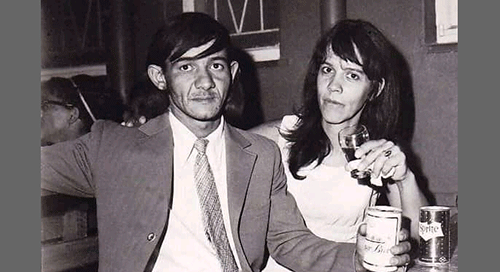Well, many were always under the misplaced impression that the football-crazy Sissing was an intruding immigrant from Cape Town (‘Kaapnaar’).
But truth be told, the long-haired hippy-look-like defender was a pure-born and bred Namibian, birthed in the southern capital Keetmanshoop in 1942.
The early life
‘Uncle Bob’ spent a significant slice of his formative years in Karasburg, home to a reasonably-large Coloured community that hailed from across the Orange River in the Western Cape Province.
His football path got off the ground as a lethal attacker for the town’s team, Marists United, aged 13, hardly out of his pair of shorts.
After relocating to the city of bright lights Windhoek in search of greener pastures, the football-mad Sissing teamed up with some of his homeboys from Karasburg to resurrect Marists United in Khomasdal.
Under his stewardship, the newly-formed team recruited some of the finest athletes in the business, spearheaded by doubtlessly the most complete ‘footie’ to have ever emerged from the entire Coloured/Baster community, Ellen van Harte.
May his gentle soul continue to rest in ancestral power.
Honours
Sissing masterminded a protest against a racially-motivated directive from the Apartheid regime, which courageously challenged the balkanising aspects of institutionalised tribalism in sport.
The protest was triggered by the disputed composition of the Non-European Invitational Eleven, made up of a mixture of Colored and Bantu (Blacks) players to represent South West Africa (SWA) in a South African Inter-Provincial tournament in neighbouring South Africa in 1966.
Unsurprisingly, the racially-driven White administration would have none of that, and ordered the selectors in typical military fashion to split the team in two – one for Coloureds and the other for Blacks.
However, the enraged Sissing dug his heels in the sand, bravely telling authorities where to get off.
He singlehandedly told the stubborn White administration that in no uncertain terms, the selected team would travel as one unified unit or else there would be no separate teams.
Ultimately, the envisaged tour was chalked off the radar.
Challenges
Apart from fighting the puke-inducing system of racial segregation, he constantly advocated for justice for all citizens.
The often controversial or rather misunderstood Sissing also had his fair share of misfortunes.
He escaped death by the skin of his teeth when a pale-skinned German national pulled the trigger of his unprovoked loaded gun.
The reckless ‘Jerry’ deposited a deadly bullet in his abdomen at the Star Hotel, Khomasdal, in 1974.
Although the hard-as-rock defender miraculously survived the near-catastrophic ordeal, the fatal incident abruptly abbreviated his football-playing career.
However, he was not to be distracted.
He calmly turned his hand to football administration.
The likeable football guru will go down in history as the most astute football administrator of his generation from the Land of the Brave.
Sissing played a pivotal role during the formation of the National Soccer Super League (NSSL) when some of the country’s fed-up leading football clubs severed ties with the white-dominated Central Football Association (CFA) under the auspices of the South West Africa Football Association (SWAFA) in 1985.
Left with egg on their face, the vindictive local municipalities retaliated, shamelessly abusing their illegitimately-acquired powers, placing a ban on the usage of sport stadiums by the so-called ‘rebel league’.
As fate would dictate, Sissing and his trusted buddy Reggie Diergaardt came to the rescue of their stranded comrades, proving the Khomasdal stadium, did not fall under the authority of the racist White administration.
He acted swiftly, and managed to convince his colleagues in Narraville, Walvis Bay, to provide their facilities for the militant breakaway league.
A strong believer in equality for all, he marshalled another rebellious group when he walked away from the CFA to establish the Namibia Central Football Association League (CNFA).
The new kid on the block found refuge with the politically-motivated SACOS, peddling on the much-despised slogan, ‘No Normal Sport in an Abnormal Society’.
The sole founder of Atlanta at Chiefs, Sissing was instrumental in importing great players from Cape Town, namely Willy Rwida, Boet Mathews, Goggo Barreto, Ronald Wentzil, John Abrahams and a few other formidable ‘footies’ of remarkable pedigree.
These imports left their mark in the league, adding much-needed value to the overall standard of domestic football.
Lest we forget, Sissing was the founder member of the first-ever mixed-race football team in Apartheid SWA when he teamed up with Vic Lovell to form the short-lived City United in 1977.
A true servant of his subjects, he boasts a filthy rich resume that extends beyond the beautiful game of football.
An unshakeable, steadfast ,membership card-carrying cadre of the ruling party Swapo, the forever-visible, uncompromising freedom fighter-cum-retired ‘footie’-turned-political-activist served his political home in various lowkey portfolios, including that of chief mobiliser for the rapidly-growing populated Khomasdal residential area.
His long-held wish was to witness his community given fair treatment while accorded a decent place in the sun within the kingdom of their ancestors.
The much-anticipated imminent renaming of the iconic Khomasdal stadium to Sissing will, in all likelihood, draw a silver lining on an otherwise long-lasting legacy.
May his gentle soul continue to live in eternal peace.


